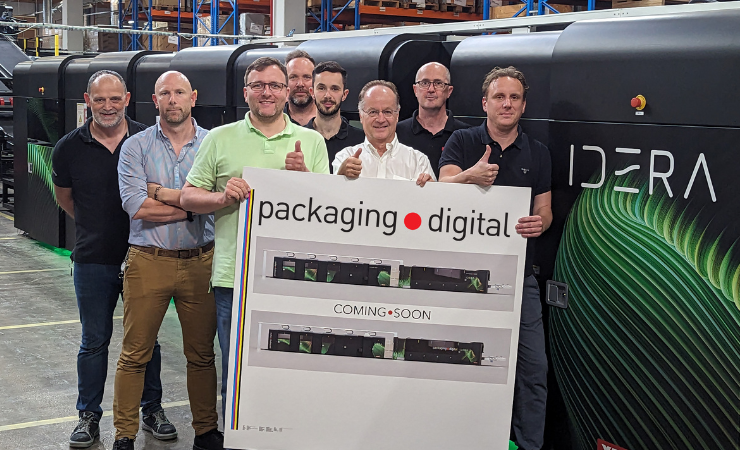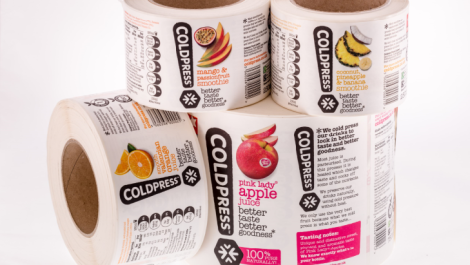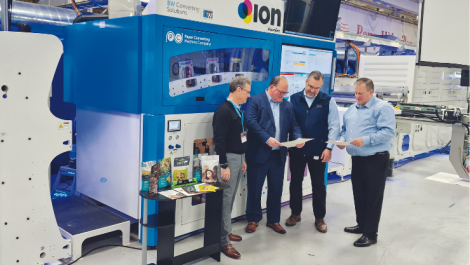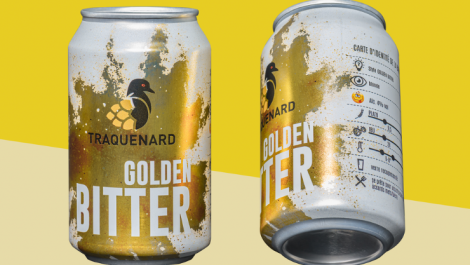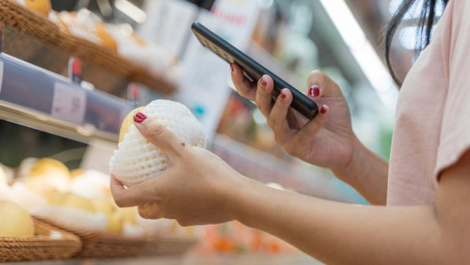The latest generation of sheet-fed presses promise to take digital carton and corrugated packaging to the next level, as David Pittman reports.
Cartons and corrugated packaging are markets that have had exposure to and shown interest in the capabilities of digital print.
Yet they remain packaging markets where digital has achieved small gains rather than widespread adoption. Numerous systems are now being introduced and pushed to alter this scenario.
EFI and its Nozomi platform is probably the one with the largest footprint here, figuratively and literally, with such presses being used as a single-pass option to print corrugated sheets for packaging and display work. Systems are installed all over the world, with many companies successfully producing packaging work off of them. Durham Box, DS Smith and Complete Design & Packaging are notable examples.
EFI has its eyes on further growth in the corrugated packaging market using single-pass inkjet, with its facility in Castellon, Spain now transformed into a world-class manufacturing operation for production[1]level single-pass inkjet printing.
Evandro Matteucci, vice president and general manager for packaging and building materials at EFI, opines, ‘EFI has placed a particular focus on the packaging market as it has worked to transform the Castellon manufacturing facility as well as the research and development arm located there. This includes optimising operations to support ongoing innovation and to leverage our expertise. Our industry-leading single[1]pass technology is especially applicable to this growth market as it increasingly transitions to digital.’
Domino’s X630i is also a single-pass digital press for the corrugated market, printing at up to 75m/min or 4500 sheets per hour at 600 x 600dpi resolution and on a maximum sheet size of 1600 x 3000mm. It includes a servo-controlled leading-edge bottom feeder for continuous feed operation, cleaning, inspection, unique vacuum sheet transport, drying with either bundler and stacking output options. Independent II of Kentucky is a well-document and award-winning user of the X630i platform.
The first customer for Xeikon’s Idera single-pass corrugated platform is packaging.digital, an independent print service provider in Germany for corrugated board manufacturers and converters. Based in the greater Cologne area, the company will serve corrugated manufacturers and converters with high-quality digital printing technology and in-depth expert consultancy. The company’s business model is based around delivering OEM packaging services for integrated corrugated cardboard plants, converters, stationary trade and e-commerce. This model targets those manufacturers and processors of corrugated packaging and displays that do not have in-house digital print production facilities.
To do this, it has opted to install Idera, which runs food-safe, pigment[1]based aqueous inkjet inks, with the ability to handle a 1.6 x 2.8m board size – whether coated and uncoated in the F to BC flute material bandwidth – and print at up to 150 linear m/min. The 100% water-based inks, with no UV components, meet the environmental and sustainability targets of packaging.digital, whilst the technology operates at what is claimed as the lowest known power consumption for digitally printed corrugated formats on the market.
Delta SPC 130 runs with a non-hazardous ink system and features IR/ UV drying. This press is a result of the joint venture between Koenig & Bauer and Durst and is a single-pass press for corrugated equipped with Durst’s SPC drop-on-demand printhead technology. The two companies have also collaborated to develop and launch VariJET 106. This is a modular single-pass, simplex B1 format sheet-fed inkjet press, aimed at the folding carton market. It runs seven water-based food compliant inks (CMYK+OGV), making it suitable for food applications.
The build programme for this press has already been scaled up to cope with anticipated high demand for digital production in folding carton markets. Beta sites and live production are now a reality.
Matt Brooks, head of packaging, Digital Printing Solutions at Agfa, notes that single-pass inkjet has, so far gained minimal traction in the folding carton market. Rather, he says, ‘There has been some penetration in corrugated; in folding carton, converters have been crying out for an oversized B1 press running water-based inks at high-speed.’
The company’s forthcoming Speedset press will cater for such demand, with the latest generation of Agfa inks offered as aqueous formulations, as well as standard UV options. Speedset offers a speed of 11,000 sheets per hour, which makes the machine a highly productive option for a market used to such high levels of press throughput. Heidelberg’s Speedmaster XL 106 can readily achieve 18,000 sheets per hour, for example.
Mr Brooks adds ‘Cartons in particular is not really a market for short runs and personalisation, as has often been the way digital is perceived. That’s a given when it comes to digital, but it’s not necessarily something that carton converters are going to be buying based upon or even selling into the market.’
That largely pertains to the application of such packaging. Whereas labels and to a lesser extent flexible packaging have more potential when it comes to personalisation as primary packaging, folding cartons and corrugated boxes are secondary or even tertiary packaging products so personalisation is less important. Variable data and serialisation become more important in those markets, but which must be coupled with high quality print at high speeds, as Mr Brooks notes.
This is a view shared by Matthew Evans, director at Kalas Packaging, who notes, ‘When we brought in digital folding carton printing, we envisaged producing lots of variable data and personalised jobs, which we do some of, but it’s not the core of what we print digitally. Where the opportunity truly lies is in small to medium run lengths, where common profiles are shared by multiple SKUs.’
Kalas Packaging is a user of HP Indigo’s 30000 sheet-fed LEP press. It was the first in the UK to install such a machine, and allowed the company to expand beyond horticultural labels, which at that time, were the company’s primary source of business but were subject to frequent peaks and troughs given the highly seasonal nature of the work. In the six years since starting working with the HP Indigo 30000, the company has grown from a £1.5 million business to one turning over almost £4 million.
‘We had previously produced folding cartons so knew the market and work involved to some extent,’ continues Mr Evans. ‘What we sought was an option to differentiate ourselves and identified that digital was, and still is, going to be important in the future.
‘We have established a separate part of the business to focus on folding cartons, which is important as it’s a totally different mindset selling digital to selling litho. Sales people inherently look to target the big orders and chase the big numbers, whereas digital is more about small, more frequent numbers. It’s very difficult to sell them alongside one another, so separating digital out into its own operation is important to success.’
Also in the UK is AA Labels, which is seeking to capitalise on expected growth in the country’s packaging industry over the next five years through investment in hardware to advance its folding carton offering. The Peterborough-based business specialises in designing, producing and printing labels, although offers folding cartons as a complement to label products. To date, this has been aimed at small to medium businesses who require affordable short print runs, with quick turnaround times. With the UK packaging market expected to grow by 12% in the next five years, AA Labels has sought to upgrade its packaging capabilities with an improved offer to meet the needs of manufacturers, retailers and distributors. An investment of £1.1 million has been made into new, state-of[1]the-art machinery to fulfil customer demand for printed packaging across a range of industry sectors, although specifically those operating large businesses. This includes an HP Indigo 12000 digital press that can print up to 4600 sheets an hour, enabling large orders to be processed. Being a duplex press allows packaging to be printed on both sides, even on a thicker substrates. An auto-fed TruCoat UV lamination machine from Tec Lighting has also been installed. With a reduced cost up to 50% less than the standard process, this system can deliver gloss-satin and matte coatings, with a fast turnaround time of less than five minutes for each to be applied.
Shoaib Akram, project lead at AA Labels, explains, ‘Up until this point, we have been restricted by the number of orders we could fulfil due to the scope of the existing printer. Following market research, we knew that there was potential to build our offer for larger print runs, whilst maintaining the high level of quality and customer service we are known for. The investment in the new press means we can print to the bigger size of B2+, a dimension frequently used by retailers, manufacturers and distribution networks. This will lead to the packaging division increasing from 5% to 20% of overall sales.’
At McGowan’s in Dublin, investment in a Landa S10 has helped open the company up to a greater range of work that it wasn’t previously in the position to pitch for. By and large, this is in the folding carton market. Folding cartons are a recent addition to the McGowans product mix, facilitated by the installation the B1 digital press, which is complemented by a Highcon Beam 2 digital cutting and creasing system and a Scodix Ultra 6000 digital embellishment press.
Delga Press has also installed a Scodix machine, with a refurbished Scodix Ultra 2000 in operation and supporting an HP Indigo 12000HD digital press. A Heidelberg Diana Easy folder gluer has more recently been added to support packaging activities more widely across parent company, The Meliora Group. Delga Press now has four dedicated glue lines for folding boxboard cartons, meaning certain lines can be left setup in popular formats. The new machine, which features an updated glue system, ‘will help bring benefits in speed of running and better control’, it is claimed. In addition, as size restrictions for packaging will reduce, Delga Press will also be able to increase its offering. This has already started to be realised, with the recent launch of Boxable as an e-commerce platform aimed at sole traders, SMEs and artisan businesses.
Such developments indicate the potential in the market for digitally printed folding cartons and corrugated boxes. The technologies are there or thereabouts and the market is now switching onto the potential.
HP, for example, is stating a definite uptick in interest in its technologies for folding cartons. ‘Something has definitely changed since the pandemic,’ says Peter Jolly, the press manufacturer’s UK and Ireland country manager. ‘We think five years’ worth of digital adoption has happened in 12-18 months. There’s a different mood music in the industry. The multi-SKU approach is definitely here to stay.’
Mr Matteucci opines, ‘More than 250 billion square metres of corrugated board are printed each year worldwide, and we believe a substantial percentage of that can be transitioned to single-pass digital printing, bringing additional flexibility, sustainability and profitability to packaging converters. It enables them to benefit from high-quality, production-level print on demand that minimises waste and increases flexibility for these producers and their retail and brand owner customers.’
Updates back down the supply chain further support such a statement. Agfa’s patented Thin Ink Layer technology reduces ink consumption by up to 30% compared to non-Agfa inks. Domino has recently implemented a £6.6 million upgrade to its Liverpool manufacturing plant, specifically targeted at the production of UV inkjet inks and giving it full end-to-end control of the digital printing process. By controlling the development, design and manufacturing process for its UV inkjet digital printing inks, Domino will be able to adjust more easily to changing requirements, including customer demands for new inks and reformulations due to materials shortages and reclassification.
As part of the investment, Domino has installed a new state-of-the-art automated production line to manage material handling, formulation, processing, filling, inspection and packaging of high-volume UV inks, with the use of vision and robot technology to ensure finished product quality. This is set to ‘significantly’ improve capacity, as well as efficiency in the production of inks. Dedicated holding vessels and piping for each individual UV ink colour will reduce the need for changeovers between ink batches, increasing capacity, while reducing wastage from cleaning.
David Ellen, divisional director, digital printing at Domino, comments, ‘Domino is committed to providing innovative solutions that drive success in the digital era and, as such, we are delighted to announce our investment in this new state-of-the-art facility. This expansion will help us to ensure that we can deliver a consistent, high-quality output to satisfy the demands for our customers, so that they can, in turn, elevate their products and exceed their customer expectations.’
KNF’s Smooth Flow Pump technology for recirculating ink delivery systems also contributes to successful development and deployment of digital systems, specifically those using drop-on-demand. This new technology sees a reduction in the component count and complexity, designed to make the system smaller, simpler and less costly to manufacture, operate and maintain. With the ink flowing smoothly through the system, a lower system operating pressure is achieved, reducing the load on the pumps and other system components, extending their lifetimes. Another advantage claimed of low pulsation is that the system runs ‘smoothly and quietly’ and is more energy efficient, as well as having increased reliability. Further, reducing the total volume of ink in the system, ‘significantly makes purging, cleaning, and priming quicker and less costly,’ the company states.
‘There is appetite and demand for digital in cartons and corrugated,’ concludes Mr Brooks. ‘We expect next year, 2025 and into 2026 to be a transition period for converters, especially of folding cartons, and digital will grow its market presence and share.’
This article was first published in issue 6 (October) 2023 of Digital Labels & Packaging; register here to receive Digital Labels & Packaging

